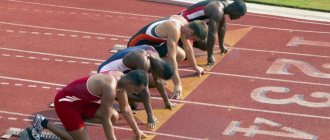Hello guys, everyone.
Running on an empty stomach in the morning, its effectiveness has been studied for a long time. This technique has positive and negative sides. We invite you to understand together: how to run to lose weight, what and when to eat before and after a run.
For a long time, many different studies were conducted that made it possible to find out the harm and benefits of running without real food.
Features include the following:
- Fat burning occurs faster when jogging on an empty stomach. Therefore, when jogging to lose weight, it is advisable not to eat. In this case, active burning of subcutaneous fat occurs, and muscle relief becomes more noticeable.
- Stomach disease will not allow you to train on an empty stomach. This is due to the fact that a huge load negatively affects the body.
- Lack of blood sugar causes the athlete to have poor control of movement. It is advisable to run on a prepared track.
Do not forget that exercising on an empty stomach every day or in the evening does not give the desired results. Therefore, it is necessary to create a special dietary program.
The benefits of morning running on an empty stomach
Due to the physiology of our body, after waking up from a night's sleep, small glycogen reserves appear in our body, which is reflected in drowsiness and weak inhibition for 15-30 minutes. Glycogen itself is an important part from which our body draws its strengths; when its content is low, the human body finds other sources of energy.
As a rule, these sources are fat deposits, the intensive combustion of which will occur during jogging before taking it. This pattern is caused by the stimulation of stress, which is essentially morning hunger, in particular, inspiring our brain to activate all possible reserves, in particular fat, which plays the role of an alternative source of energy.
The undeniable usefulness of a morning jog before the first meal is visible to those people who dream of getting rid of excess weight caused by the accumulation of subcutaneous and visceral fat.
Tip: It is recommended for people with a slow metabolism to run in the morning on an empty stomach. In this version, the body becomes accustomed to this type of stress and results in automatic fat burning while it triggers an accelerated metabolic process.
Accelerated metabolism reduces the tendency to obesity, including the accumulation of visceral fat, improves the removal of toxic substances from the body and has a positive effect on the cardiovascular system.
In addition, people prone to obesity are advised not to eat before running because the food they eat immediately stimulates increased insulin production, which in turn inhibits the breakdown of fat cells.
Moreover, it is advisable to run in the morning on an empty stomach for people suffering from depressive disorders. This is due to an increase in the production of endorphins, which are responsible for lack of mood and increase the brightness of perception of current events.
In addition, constant running exercises will help normalize and ease the morning awakening, and will also allow you to burn extra calories during the first half of the day, regardless of the type of human activity.
Running and cycling
For cycling sports in which the body's endurance plays a critical role, exercise on an empty stomach is used to habituate the body to the normal input of its own energy resources and improve VO2 Max performance (oxygen absorption from the air).
For example, according to the journal StrengthandConditioning Research, incorporating a “fasting mode” into their training allowed cyclists to increase their PWR, which is the power-to-weight ratio, without compromising endurance.
So is it possible to run in the morning on an empty stomach?
Running on an empty stomach, especially in the morning, is only useful for people who intend to lose weight, or for people with a slow metabolism, which limits their diet and creates favorable conditions for gaining fat mass. Moreover, such people should jog on an empty stomach for no more than 30 minutes a day, and should remember that burning calories will occur throughout the first half of the day , and there is no need to exhaust themselves with hour-long marathons, risking harm to the heart and overtraining.
On the contrary, athletes with large muscle mass should forget about running before meals, but the first breakfast should be limited to 200 grams of dairy or other protein products. This will give you the necessary supply of nutrients, eliminate the possibility of the body absorbing its own muscles, and prepare the gastrointestinal tract for digesting the main food, which should be eaten no earlier than half an hour after the end of the run.
Thin runners should drink a glass of kefir ; weak coffee or tea is also allowed, which will give your body the necessary carbohydrates. Thus, you will minimize the effect of catabolism on your already small muscles, and also protect your heart from overwork and prevent the possibility of its atrophy as a result of regular morning exercise combined with a lack of nutrients.
The harm of running on an empty stomach
It is also necessary to talk about the negative aspects of running on an empty stomach: there are people who have contraindications. We list those at risk:
- The ban applies to those with minimal fat reserves. For example, some athletes are involved in building muscle mass, as well as people suffering from dystrophy. The limitations are explained by the fact that in the absence of glycogen and fat deposits, the body will produce energy from muscles, destroying tissue. Catabolism will appear - a phenomenon in which the hormone cortisol is actively produced, which leads to a stressful state. The function of the heart and blood vessels may be impaired, as well as the condition of this important system.
- Jogging on an empty stomach should not be a joke, even for those who have problems with the gastrointestinal tract (GIT). This is especially true for people with ulcers. During training, active metabolism occurs. The body will burn more calories, causing an increase in appetite. As a result of morning stress, pancreatic juice is released, which can cause the growth of ulcers in the empty organ.
The rule is a calm rhythm of training on an empty stomach. Its duration cannot exceed half an hour. If the diet is not followed in combination with morning running, it will lose its benefits. A state of fatigue may occur, which will entail: decreased tone, loss of strength, drop in pressure. Then a long process of energy restoration will begin.
Harm from running on an empty stomach
Running on an empty stomach in the morning, and throughout the day, is strictly prohibited for people with minimal fat content in their body, especially for athletes who are actively building up lean muscle mass and people suffering from dystrophy.
These restrictions are due to the same morning lack of glycogen reserves, because in the absence of fat, the body will be forced to absorb energy from muscle tissue, destroying your muscles. The destruction of muscles gives rise to a phenomenon called catabolism, which increases the production of cortisol, one of the main stress hormones. People with dystrophy must be especially careful when running on an empty stomach, because the lack of both fat and significant muscle volume can affect the functioning of the cardiovascular system in general and the heart muscle in particular.
It is important
It is not recommended to practice running before meals for people with gastrointestinal problems, especially people suffering from stomach ulcers. Jogging activates the metabolism, causing the body to burn an incredible amount of calories, while causing a strong appetite.
It is the appetite caused by stress from running, especially in the morning, that promotes the secretion of gastric juice, and if you take into account the fact that the stomach is empty, the juice begins to affect the existing ulcer and causes it to increase.
Running on an empty stomach should take place at a calm rhythm; the jogging itself should not last more than 30 minutes. Otherwise, you neutralize all the beneficial benefits, and during regular exhausting exercise without first eating, your body risks entering overtraining , which threatens loss of strength, decreased vitality, surges in blood pressure and an extended recovery period after exercise. This rule applies primarily to people involved in strength training and working in grueling physical work.
This is interesting
- [uaf_vkcount url='https://beginogi.ru/skolko-kaloriy-szhigaet-30-minut-bega-na-begovoy-dorozhke-ili-na-ulitse/']
How many calories does 30 minutes of running a day burn in our article?
- [uaf_vkcount url='https://beginogi.ru/nauchitsya-begat-100-metrov/']
If you want to lose weight in your legs, you will be interested in our article “How to run properly to lose weight in your legs and thighs?”
What results can you expect from a morning run?
Running in the morning strengthens the heart muscle and increases resistance, after which blood circulation is normalized and oxygen is supplied to all major tissues of the body. But athletes, beginners and supporters of an active lifestyle may pursue other goals. Running in the morning on an empty stomach can lead to the following results:
- Get rid of subcutaneous fat while cutting to get relief.
- Fast weight loss.
- Growing resistance.
- Strengthening metabolism and its normalization.
- Improve your mood and relieve nervous tension.
- Respiratory system training.
- Improved bowel function.
- Reduce blood cholesterol levels.
Important ! Before and during a fasted run, you should drink water and use a low intensity and cadence.
For weight loss
With the right approach, during your morning jog you can get rid of excess fat without compromising your health.
How does the fat burning process occur:
- The process of mobilization of fatty acids (lipolysis) - adipose tissue decomposes to form fatty acids.
- The process of transporting fatty acids into the bloodstream.
- The process of fatty acid oxidation is the burning of adipose tissue.
Why fasting in the morning is great for weight loss:
- The process of losing weight begins with a lack of calories: you need to spend more than you absorb. Because a short fasted morning jog will help kick start the fat burning process faster.
- The workload of the heart is aimed at working with glycogen stores in the tissues, and when they are active on an empty stomach, the body does not look for these stores, so it uses fat for this property.
Reference . Don't be afraid to completely exhaust yourself by jogging in the morning on an empty stomach, because during fasting classes the body cannot use one hundred percent of the fat stored in the tissues. The concentration of fatty acids in the blood increases, which exceeds the body's ability to use fats as an additional source of energy.
Is muscle mass lost?
Many gym goers believe that running on an empty stomach can lead to muscle loss.
A common legend goes like this: “If you start exercising in the morning without getting the required amount of glucose and carbohydrates, the body will use muscle proteins.”
What's actually happening:
- The human body contains deposits of glucose in the liver and muscle tissue in the form of glycogen.
- A small percentage of these reserves are consumed during sleep, but the energy may be sufficient for a lower activity in the morning (gymnastics, morning cardio, jogging).
- Even after glycogen stores are completely depleted, the body will begin to obtain energy from free fatty acids and only later from muscles.
Protein in the muscles is the last to be used up because athletes and runners don't have to worry about it during their morning run. Dizziness and moderate weakness will signal exhaustion.
How to protect yourself from muscle loss:
- Don't end up with a heavy cardio load. A good duration for a morning run is 30-40 minutes.
- It is necessary to provide the body with adequate nutrition during the day (a balance of carbohydrates, fats and proteins), and also have a good breakfast after running on an empty stomach.
- You should definitely include heavy weight exercises in your training program to build muscle mass.
Video. Nutrition Basics Before and After Running
httpv://www.youtube.com/watch?v=embed/ro8K4AtDfug
- Nutrition tips for breakfast, lunch and dinner from the chief cardiac surgeon of the Russian Ministry of Health. Three commandments of a healthy heart from academician Leo Antonovich Bockeria.
- Breakfast is a person's first meal of the day. Breakfast should take into account that you have been sleeping and recovering all night, and food has not arrived for a long time. Therefore, the most important thing is that breakfast has enough calories. Don't forget about the benefits of fiber, and the best time to take it is in the morning. My choice is PORridge! After such a breakfast, any athlete can start the day with a good workout!
- Which breakfast should you choose? Advice from experienced athletes
Morning running on an empty stomach: recommended running technique
We all want to look presentable and be thin. In the name of losing weight, people make sacrifices and try different ways to lose weight. One of them is running in the morning on an empty stomach, whose benefits and harms are widely discussed on the Internet.
The main thing is that you must choose a suitable running technique, using which you will not get tired after 5 minutes, but will continue to move towards your goal. Running technique includes head, arms, shoulders, knees and chest position.
The position of human body parts corresponding to the chosen running technique
- The body does not get tired while running. There is no need to raise your head, you need to hold it so that it is clearly visible at a distance of 10-15 meters ahead. This permission will be enough for verification, and you will not stumble. You are allowed to look around and smile at those who come; a good mood will not interfere with the healing process.
- Your shoulders should be relaxed, only your arms working hard, bend your elbows 90 degrees.
- The fists don't really need to be clenched very much, but at the same time a lot of energy is burned.
- The subject's body should be tilted forward 5-9 degrees.
- Steps should be small, but quite frequent, without lifting your knees up.
- Foot placement is also important. Running on an empty stomach for weight loss is best done using a variation of placing the leg on the entire foot and from heel to toe.
Choose the running technique that suits you, run in the morning on an empty stomach and get the desired result, not a bad mood. Walking and running in the morning on an empty stomach is an alternative to fitness clubs.
Running in the morning on an empty stomach is an effective method of losing weight and a good replacement for expensive fitness centers and exercise machines. In addition to jogging in the morning, you can choose an economical diet. Therefore, at a low cost, you will get good results, in addition to regular morning walks in nature. The only criterion is that you need to conduct training correctly and without fanaticism.
Running in the morning on an empty stomach accelerates metabolic processes and engages all muscles. This shock awakens the body from sleep and prepares it for work. Morning run also:
- Fills the blood with oxygen;
- Strengthens muscles;
- Be energized and filled with energy;
- Increases immunity;
- Enriches the mood
Physiologists say that from 5 to 8 am the human body is at the peak of its biological activity, so during this time physical activity is easier to tolerate.
Video. Should you run on an empty stomach?
Cardio on an empty stomach! Is it effective for losing weight?
How many hours before training can you eat?
Cardio on an empty stomach: who can do it?
- >
Cardio on an empty stomach! Is it effective for losing weight?
Frequently asked question about cardio on an empty stomach! I hope you find it useful!
- >
How many hours before training can you eat?
Another video answer to a question from my subscriber. The question is: “Tell me how much time should pass after eating before training.”
- >
What to eat after a morning run: options
You can have a snack half an hour after class. It is important to give the body all the substances it needs. Here are some examples of a healthy breakfast after a morning run:
- Chicken breast . This breakfast is low in calories and can be prepared in a variety of ways. Chicken satisfies your appetite well, allows you to replenish protein in your muscles and gives you a boost of energy for a long time.
- Banana . Bananas can be consumed before or after a run. They provide vital energy and prevent breakdowns. You can make healthy smoothies from banana, berries and milk: just put the ingredients in a blender for a couple of minutes. Bananas contain a unique consistency of vitamins and minerals that improve resilience in athletes.
- Fruit salad . A rational option for saturating the body after exercise with the vitamins, minerals and carbohydrates it needs. You can combine orange, apple, grapefruit, berries and other products at your discretion. You can use low-fat yogurt as a dressing.
- Almonds . It contains many antioxidants and helps normalize blood cholesterol levels. You can add it to your post-run breakfast if it's porridge, fruit salad, smoothies, and so on.
- Oatmeal . Oatmeal is one of the most popular and favorite breakfasts in the world. Eating a bowl of this porridge after a morning workout will give you a burst of energy for the whole day. It contains a lot of fiber, which helps cleanse the body. Oatmeal can be consumed with skim milk, nuts, berries and so on.
- Yogurt . For a quick post-run snack, you can use Greek yogurt with pieces of fruit and nuts. It contains a lot of proteins that help build muscles and speed up metabolic processes. But choose yogurt that doesn't contain artificial flavors or sweeteners.
Now you understand what to eat before your morning run and what you can eat later. It's important to listen to your body and give it what it needs.
Several breakfast options
The following recipes will make your breakfast and jogging results ideal:
Oatmeal with honey bananas
It is optimal to give preference to unprocessed oatmeal, the appearance of which resembles flattened grain, and the cooking time is 10 minutes.
Porridge can be diluted with bananas:
- the fruit is cut into slices and placed in a frying pan with the addition of a small amount of brown sugar and cinnamon;
- oatmeal can be prepared with water or milk;
- After preparing the porridge, bananas are laid out on it, after which the dish is poured with honey.
Whole grain pancakes
To prepare them you will need:
- mix a glass of fruit juice with a couple of eggs, a glass of flour and half a packet of baking powder and vanilla;
- small pancakes are formed from the resulting mixture;
- The finished pancakes are topped with honey or syrup.
This is important In any case, you should not starve yourself in order to achieve faster results, as this may promote the opposite effect. Moderation is important in everything, and only with proper nutrition can you get the maximum benefit out of running.
Morning running for beginners: weight loss schedule
A jogging program plays a big role in weight loss for both men and women. A schedule develops a running habit. An exercise program helps accelerate the development of results and helps the body adapt to the load.
When planning exercises, it is necessary to combine rest days and running days. 3 sessions per week is considered a traditional loading program.
Running for weight loss is not meant to burn calories!
Running for weight loss, how to run to lose weight? Since childhood, it has been drilled into our heads that running to lose weight is simply necessary. Is this so? What does the term “run to burn fat” actually mean? Is there a difference between running to lose weight? And where to do cardio for weight loss - on a track, an elliptical or an exercise bike, in the park?
To begin with, I’ll say right away - I myself practically don’t run at all. I’ll say even more - many famous athletes also really dislike cardio exercises. However, my blog is more for people who start a new life on Monday than for advanced athletes, and let me tell you everything in order.
So, if you watch my video blog, you know that to lose weight you must meet three conditions: 1. calorie deficit 2. No insulin spikes 3. fast metabolism.
We’ve covered this in detail and how easy it is to lose 15 kg in a couple of months in these two videos (one and two), and now we’ll focus on the first point. A caloric deficit means that you must consume less energy than you expend.
Ideally, the deficit should be no more than 10-15% and we can create it either by increasing the load (that is, spending) or reducing income (that is, cutting back on food). And the biggest mistake would be to think that running is designed to burn calories.
From the point of view of common sense, what is easier: run for 40 minutes on a treadmill and burn about 500kk or not eat one Snickers. (Snickers about 6.6km run). Therefore, I always insist that a calorie deficit must be created by cutting back on food, and not by increasing consumption.
Attention!
That's why - stop looking at the number of calories you burned. Running for weight loss uses a different mechanism. You need to look at your heart rate and the duration of the cardio load. And that's why:
Source: https://freshlife28.ru/bodybuilding/beg-dlya-pohudeniya/











